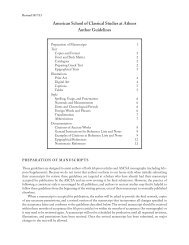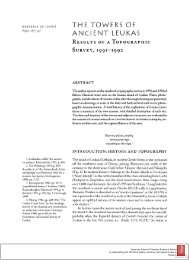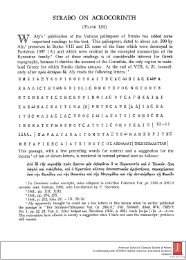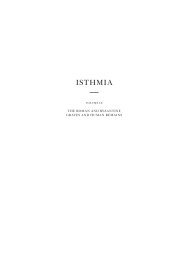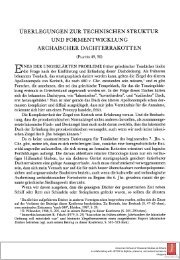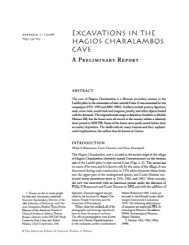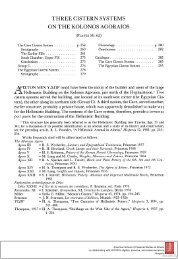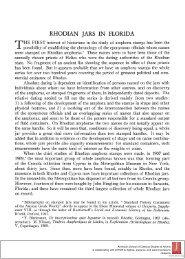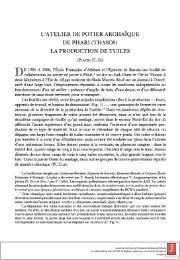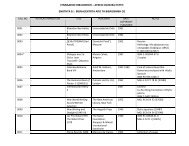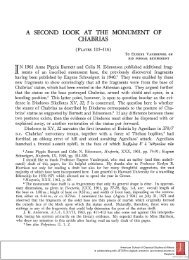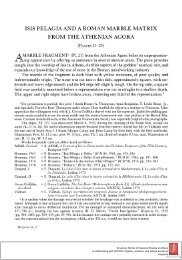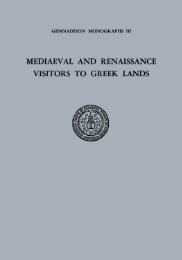the attic stelai - The American School of Classical Studies at Athens
the attic stelai - The American School of Classical Studies at Athens
the attic stelai - The American School of Classical Studies at Athens
You also want an ePaper? Increase the reach of your titles
YUMPU automatically turns print PDFs into web optimized ePapers that Google loves.
THE ATTIC STELAI 323<br />
<strong>the</strong> Attic Stelai or from <strong>the</strong> records <strong>of</strong> some o<strong>the</strong>r confisc<strong>at</strong>ion; finally <strong>the</strong> A<strong>the</strong>naeus<br />
passage <strong>of</strong>fers no hint wh<strong>at</strong>soever as to <strong>the</strong> epigraphical source which Pollux was<br />
using in his Book X.<br />
K6hler 15 assumed th<strong>at</strong> Poiltlx found his text <strong>of</strong> <strong>the</strong> Attic Stelai in <strong>the</strong> Psephism<strong>at</strong>a<br />
<strong>of</strong> Kr<strong>at</strong>eros, and <strong>of</strong>fered as 'pro<strong>of</strong> ' <strong>the</strong> assertion th<strong>at</strong> <strong>the</strong> description <strong>of</strong> <strong>the</strong><br />
Stelai in X, 96, contains echoes <strong>of</strong> <strong>the</strong> accus<strong>at</strong>ion <strong>of</strong> Alkibiades as we find it in<br />
Plutarch (Alkibiades, 22). It is indeed quite certain th<strong>at</strong> Plutarch made use <strong>of</strong><br />
Kr<strong>at</strong>eros when he wrote this section <strong>of</strong> <strong>the</strong> Life <strong>of</strong> Alkibiades,'6 but <strong>the</strong> only phrase<br />
<strong>of</strong> his which might be heard as similar to Pollux occurs not in <strong>the</strong> text taken from<br />
<strong>the</strong> Psephismctca, where <strong>the</strong> verb is a&8KEwV (Alkibicades, 22), but in <strong>the</strong> preliminary<br />
summary <strong>of</strong> <strong>the</strong> charge (ao-LE/3,E&v EpL r Co OE: E Alkibiades, 19), which was Plutarch's<br />
own.<br />
If Pollux was using a full collection <strong>of</strong> texts, like <strong>the</strong> Psephismc<strong>at</strong>a <strong>of</strong> Kr<strong>at</strong>eros, it<br />
is very curious th<strong>at</strong> he chose to cite only <strong>the</strong> Attic Stelai, and yet failed to use <strong>the</strong><br />
Stelai time and again in his tre<strong>at</strong>ment <strong>of</strong> terms which we know appeared in <strong>the</strong> Attic<br />
Stelai lists.'7 <strong>The</strong> impression left by Boox X is th<strong>at</strong> Pollux thought <strong>of</strong> <strong>the</strong> Demiopr<strong>at</strong>a<br />
as listing only furniture and household equipment, and th<strong>at</strong> he could forget th<strong>at</strong> <strong>the</strong><br />
property listed had not all belonged to Alkibiades. Surely <strong>the</strong>se misconceptions would<br />
not have persisted in <strong>the</strong> mind <strong>of</strong> one who knew Kr<strong>at</strong>eros' extensive explan<strong>at</strong>ions and<br />
commentaries. Altoge<strong>the</strong>r, it is hard to believe th<strong>at</strong> a man who had not tried to use<br />
such a source when dealing with <strong>the</strong> workings <strong>of</strong> <strong>the</strong> A<strong>the</strong>nian st<strong>at</strong>e would now think<br />
<strong>of</strong> looking through a cumbersome corpus <strong>of</strong> public inscriptions to find inform<strong>at</strong>ion<br />
about furniture and kitchen implements.'8 And <strong>the</strong>re is no reason to assume anything<br />
so uncharacteristic; as a m<strong>at</strong>ter <strong>of</strong> fact, Pollux tells us <strong>at</strong> <strong>the</strong> outset, though with<br />
singular lack <strong>of</strong> grace, where his new m<strong>at</strong>erial came from. Having heard, he says, <strong>of</strong><br />
Er<strong>at</strong>os<strong>the</strong>nes' KEVoyp<strong>at</strong>KOiv, he made a gre<strong>at</strong> search for it, but when he finally got hold<br />
<strong>of</strong> a copy it proved disappointing, and he was forced after all to find for himself <strong>the</strong><br />
solution to many problems (X, 1-2). We may doubt, however, th<strong>at</strong> he found his<br />
Dermiopr<strong>at</strong>a references for himself, since <strong>the</strong>ir appearance in Book X is exactly<br />
simultaneous with Pollux's supposedly fruitless perusal <strong>of</strong> <strong>the</strong> Skeuogrcaphikon.<br />
<strong>The</strong> Skeuographikon, which in Pollux's time was circul<strong>at</strong>ed as an independent<br />
work, was actually an extract, made by some l<strong>at</strong>er writer, from Er<strong>at</strong>os<strong>the</strong>nes' essay<br />
On Attic Comedy."9 It is certain th<strong>at</strong> here, as in his historical investig<strong>at</strong>ions, Er<strong>at</strong>os-<br />
15 Op. cit., p. 398.<br />
16 Krech, op. cit., pp. 30 f.<br />
17<br />
In Book X Pollux cites <strong>the</strong> Demiopr<strong>at</strong>a for 42 items, but he tre<strong>at</strong>s 65 o<strong>the</strong>rs which appear in<br />
our text <strong>of</strong> <strong>the</strong> Stelai without referring to <strong>the</strong> Demiopr<strong>at</strong>a.<br />
18 See Jacoby, R.E., s.v. Krr<strong>at</strong>eros: " Die Zuriickfiuhrungen aus Pollux, der K. nur einmal<br />
(VIII, 26) aus lexikographischer Tradition zitiert, namentlich die der yrtto'7rpara im 10. Buche<br />
gerade auf K., sind sehr zweifelhaft."<br />
'19 Knaack, R.E., s.v. Er<strong>at</strong>os<strong>the</strong>nes: Naechster, op. cit.



